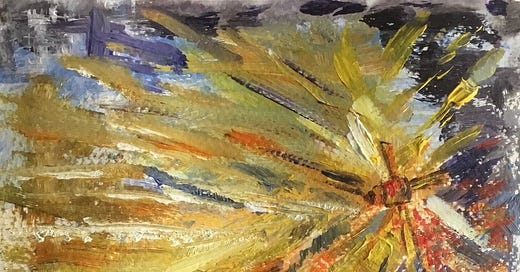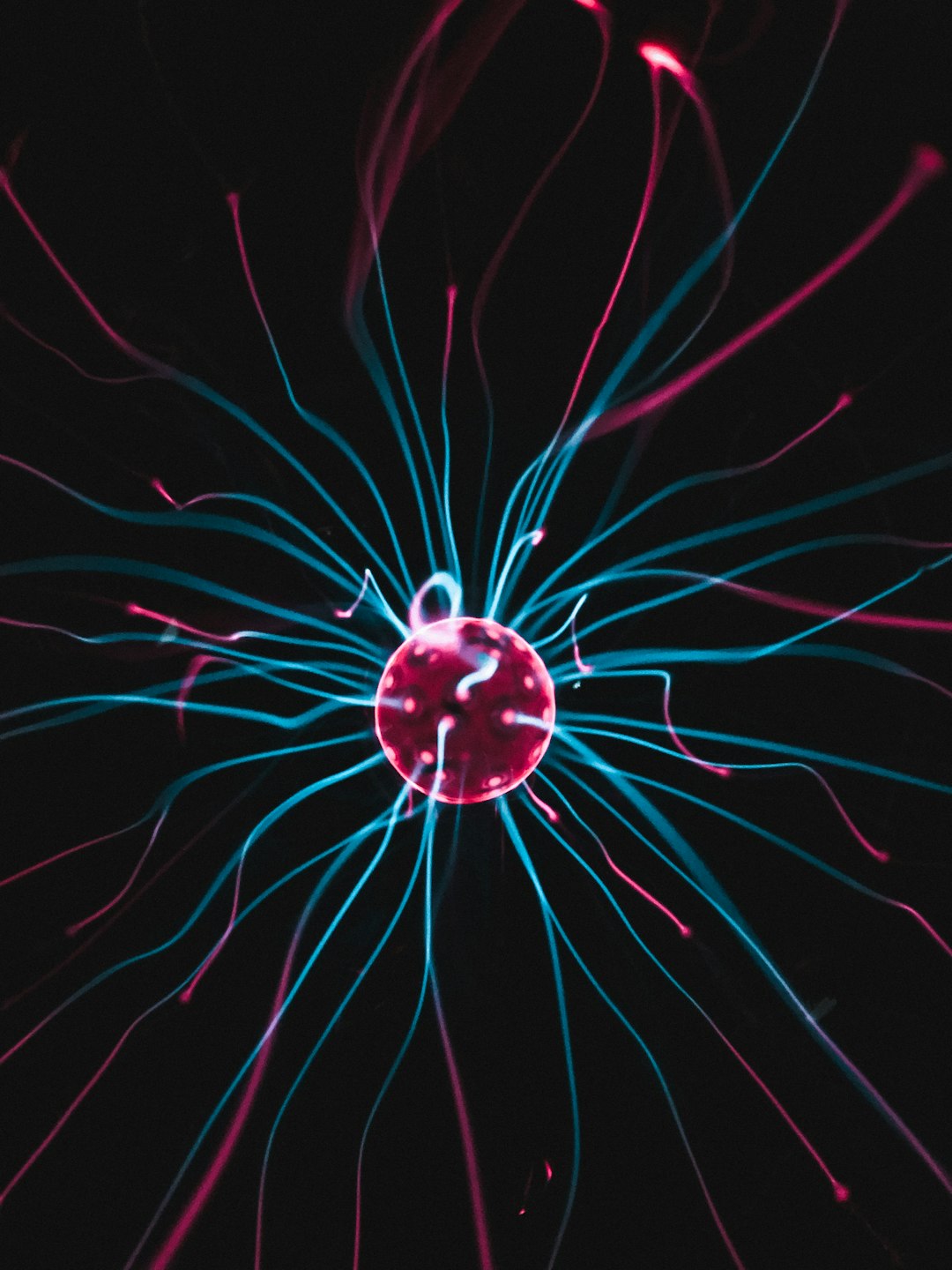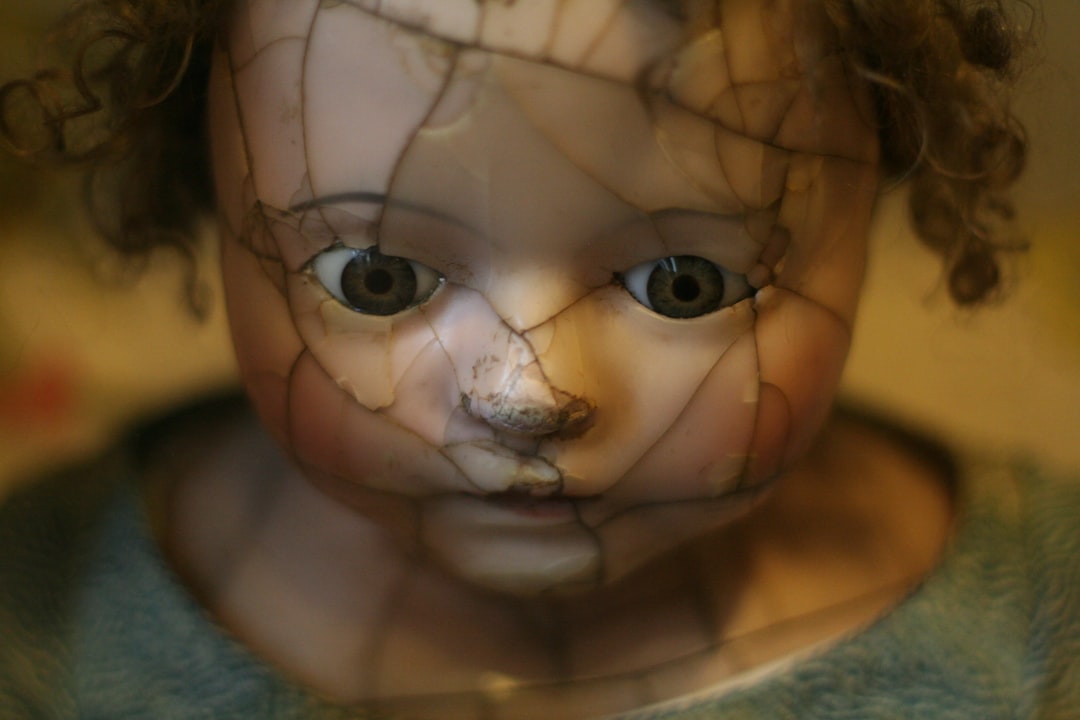The following story continues a long tradition of rockets, space exploration, and AI control. Such stories come with expectations. We call those expectations “tropes.” And while this one hits many of the correct notes, or tropes, the ending will differ from many that came before.
“Promise the Girl” first appeared in Bewildering Stories Issue 998
Promise the Girl
by Aidan Alberts
When the deep space probe launched, there was a widespread feeling that humanity had done something for the first time. There was a great sense of pride that the human race would finally poke its diminutive head outside of its cramped gopher hole. Engineered by the Requiem Corporation, the mission aspired to travel far beyond the outer reaches of the solar system. Nations of the world were promised an answer to the ultimate question: are we alone in this universe?
Well, the person strapped down to the probe’s command seat certainly felt alone.
Shaking her head, Hymn took a breath and told herself that now was the time to focus. Having second thoughts in such a crucial moment could only lead to her death. A flood of memories surrounding her lifetime of training passed through her, and it felt bizarre to be here at launch. The cold emptiness of the probe’s pilot compartment was different this time. As if the scientists back at the mission control center could detect her panic, an unexpected soft voice projected from the speakers. “It’s time for you to go now, sweetie. Everyone is waiting on you.”
Hymn flinched when she heard the voice of Dave, her father, as she had not spoken to him in a year.
“I didn’t know you were going to be here, and I know dad—I’ll be ready to launch, but I’m scared to go.”
“Why are you scared? You will do great. You have always had the nerve.”
“I’m not as sure as you. Requiem could have picked anyone, but they picked me. I think it could be a mistake.” Her voice began to tremble as she continued. “M-my whole life feels as if it were a mistake.”
“Hymn!” There was a sense of worry in the way her father spoke. “Now is not the time for this.” In that callous yet concerned statement, there was truth. The deep space probe would launch in minutes and her hesitation at such a moment would be catastrophic for his daughter.
#
Back at mission control, her father paused and shifted uneasily. Sitting in front of his cold microphone with scientists surrounding him, he thought of a memory long ago. Dave had been Hymn’s age when he learned that his girlfriend Vanessa was pregnant. He had hopelessly asked that she end the pregnancy, but she had wanted to keep the child.
All those days of panic and pain while sitting outside of the pregnancy center. After hours of waiting, Vanessa would hurry back to the truck with updates of her pregnancy. Dave would hug her and rub her back as she wept. That was all the support he could give her. He remembered the weeks when he would stare at nothing for hours, debating whether he was a despicable person for not wanting a child. No one could have predicted that when the delivery came, it would be the end of his lover.
Then his daughter was born, and his girlfriend was gone. Hymn was the only thing good in his tiny one-room apartment, where termites ate the rotting wood in the walls, and the sound of airplanes taking off rattled the tenement. The shaking would repeatedly wake his baby, who cried out in fear. Every time he gave her a bath, he noticed the little bones in her rib cage become more and more prominent. He knew he had to make a change. This was no kind of life for his daughter.
Dave thought for a moment about the offer Requiem had made him: full-time care and the finest education for his daughter, and she would never have to worry about food or money. As a bonus, they said that they would send him a small annual stipend to show their gratitude. However, all this came with one catch. He could have no further contact with his daughter until the Requiem Corporation gave permission.
“Promise the girl” is what the recruitment agent had demanded of Dave when Hymn had clutched his leg and begged him to stay with her. Looking at the agent’s hardened and grim face, Dave knew he had no other choice than to comply. He promised Hymn that he would visit her, though he barely got the words out. Her small hand slipped away from his, and she sobbed as the agent carried her away. He never did get to see her until Requiem granted him clearance twelve years later. Breaking the terms of the strict contract would have ruined Hymn’s shot at a better life.
Hymn nervously tapped her feet on the cold metal of her footrest. Inside the mission control building in the New Mexican desert, her father held the receiver up to his ear. He looked at the computer screen although he wasn’t really seeing anything. Having his only daughter about to rocket into space revived the awful burden of losing Vanessa. She had been the best part of his life. Ever since her passing, his lonely nights were filled with dreams of a young, hazel-eyed woman with strawberry hair. She always wore her favorite summer dress patterned with red and orange flowers, and she would come to him, only to die again when the morning light filtered through his bedroom curtains.
The probe’s chassis hummed as the launch mechanisms initiated. Tired and weary, Dave regretted how he had given Requiem rights to his daughter’s life. A coughing spasm overtook him as the volume from the speakers began to decrease.
“You’re starting to fade away, Hymn. We have to say goodbye soon—but I wanted to tell you that I appreciate all the little moments we had before you had to go. I’ll never forget holding your little hand at all those playgrounds and camping at night when you were scared of the stars. I hope that one day, you will get more time with your child than I had.”
Dave glanced at the neon-red countdown clock winding down to launch.
“You’ve got to go now. There is a journey ahead of you. Just know that when it’s all over, you gotta know you did the best you could have done. Nothing is worse than having known that it was in you, and you never let it out.”
“I—” Her voice broke, and she bit her lower lip. “Thank you, Dad.” She flipped down her gold visor and began pressing buttons above her head. “Your voice is slipping away. Good—” She tried to finish her sentence, but the communication was broken for the start of the launch sequence. “Goodbye, dad,” she said, knowing he couldn’t hear it. Lowering her microphone, Hymn could only hear the roaring sounds of a spacecraft powering up.
“T-Minus three minutes,” said the flight director from the mission control center.
The air inside the probe had become as humid as a rainforest. Secured by a sandpaper-like harness, Hymn winced because of how it pressed and cut into her shoulders. Her lower back was already sore from her spine digging into the metallic flat surface of her commander seat. She still had to turn on the probe’s auxiliary power units, switch off the fuel valve heaters, and double-check on the fuel engines. Throughout all this, she was afraid of failing.
However, she was not the only decision-maker on board.
Chant was the artificial intelligence operating system that would aid in guiding the probe’s trajectories and flight mechanisms. Chant appeared before Hymn’s monitor as a blue holographic image of a man in his early twenties. He was standing still with closed eyes and an expression of fatigue. For weeks the engineers at Requiem had been overloading his memory cells with itinerary data. The hologram’s face sagged with exhaustion and depletion. Though his robotic nature was much more apparent than his humanity, he had the distinctive mark of human creators.
“T-Minus two minutes,” said the intercom.
Hymn triple-checked the air tightness of her golden visor. Automatic launch procedures took over the apparatus. The only thing left to do was to wait for the launch’s acceleration pushing her deeper into the rigid seat. She was also acutely aware that the other possibility was instant death because of an unforeseen failure. Hymn listened to the creaking and groaning as she slid off the mounted position on the umbilical tower. The spacecraft was now free-standing on the launch pad.
“Hello, World,” said Chant.
The first words of her sole companion echoed in her cramped pilot chambers. Various flight control levers and red buttons were pulled and pushed as if controlled by some poltergeist. Hymn gripped the seat straps until her hands were white and drained of blood. She closed her eyes and tried to slow her breath as the aroma of heated metal filled the air. Flashing thoughts of grand success, utter failure, and last resort prayer to some personal god resounded in Hymn’s mind.
“T-Minus thirty-one seconds,” said the flight director.
Chant outstretched azure limbs that were patterned with binary code. The indifferent hologram shook out his stiff legs, reluctantly looked down at his projection platform, and disappeared into the ship’s computing system. Double-checking safety protocols and opening engine cowl flaps, he prepared the probe to launch.
“T-Minus sixteen seconds,” said the flight director.
A loud bass noise emitted from the shock and thermal absorption water system beneath the probe. Cooling fluid cascaded as a display of waterworks rushed out of the mechanical pumps under the spacecraft, shaking the frame of the ship. The water slammed into the probe’s titanium walls just as a tidal wave engulfs a corrugated hut on an unfortunate beach. The water system fully enveloped the bottom of the probe’s booster rockets, ready to suppress the coming sonic boom. Hymn’s bowels rumbled uncontrollably.
“T-Minus six seconds,” said the flight director.
In the New Mexico desert, the midday Sun beamed down on the metallic silver frame of the probe and threatened to overheat the aspirations of Requiem. Only one thing stood between the death grip of the star and humanity. The consciousness of Chant flowed through every cord, wire, and device of the probe. He saw data running through the probe’s crochet of vermillion, azure, and gold threaded circuitry. Lines of translucent code grew outwards from the origin point of Chant’s arachnid web. A robotic intelligence answered his commands. Turning over the complex enigma of launch code in his mind, Chant waited for all the simultaneous processing to transform into a true or false statement. The processing power of the probe presented his digital eyes with the code.
Answer = input ("Enter yes or no:")
if Answer == ("yes")
print ("have a safe flight")
else Question == ("no")
print ("try again")
Selecting “yes,” he activated the rocket engines.
Hymn felt herself lift off the ground, feeling enormously heavy from the intense g-forces. Thousands of feet separated her from the ground as her ship ripped through the atmosphere. Shifting her vision towards her side window, she saw the tan and green flyover states. It was a strange awareness to know that instant death could happen at any moment. The booster rockets peeled off from the probe’s body like wax wings.
Then something terrible happened. Contingency gears began to activate, and the sounds of stuttering replaced the roar of the engine as power started to decline. Hymn sensed that the ambitions of the team of scientists back at mission control might have been an overreach.
As the impaired probe pushed way past the border between Earth’s atmosphere and outer space, automatic backup power reserves flared with green lights. Recalculations of all previous plans and destinations were underway. Hymn watched her monitor as Chant organized and diagramed the options into a grid of information squares. In his state of tired pragmatism, he offered Hymn his findings.
“The probe lost sixty-five percent of its reserve fuel reaching exit velocity as a result of the booster rocket failure. Exploration capabilities are now restricted to a fraction of the original value.”
She knew what this jargon meant. No chance of making interplanetary stops. No sample collection of the icy water from Saturn's moons Enceladus and Titan. Looking at the monitor, she saw the information square containing the goal of traveling out into the Oort cloud beyond the solar system had a large red “X” crossing it out. All these planned monumental feats were canceled.
What about my return home?
“Listen… Chant… we will make it home after we have completed the mission, right?”
The artificial consciousness of Chant coursed through the golden veins of the probe. A low hum droned in Hymn’s ears. Chant was communicating with the spacecraft's computer intelligence. Comparatively, Hymn was in a cell of solitary confinement and feeling like a death row prisoner.
“We wait for commands from mission control.”
Before Hymn could question the validity of that response, Chant said something unexpected.
“Leave behind any idea of glory or accomplishment.”
#
Somewhere between Earth and Venus, the probe was assumed to be out of control and a lost cause. Meanwhile, Chant charted the probe’s course in a new direction. Hymn was rocked back into her seat headrest as the accelerating boost of the probe’s propulsion system kicked in. After a moment, the probe’s inner gravity system stabilized. She undid her straps and got out of her seat.
Hymn paced the inner perimeter of the bridge that connected the pilot compartment to the observation room. She glided in the microgravity past white spaceship sensors, black electrical cords, circular air pressure dials and protruding adjustment knobs. Hymn noticed for the first time that all the components on the six walls interlocked in a geometric pattern resembling an Escher print. This room of bizarre optical illusions, flickering lights and diverse texture overloaded her senses. She needed to be somewhere less overwhelming.
Grabbing bright yellow safety handles, she pulled herself into the separate observational cupola of the probe. She hoped to find some clarity looking out into the abyss.
She made her way into the cupola composed of symmetrical silicate glass panes, forged aluminum alloy, and steel plates. This compartment’s main purpose was to serve as the landing craft at planets the probe would visit. Floating in front of a porthole, she saw the wake of the ship with its blazing aquamarine tail streaking for as far as she could see. In the far-off distance, Hymn saw through the onboard telescope a shadow covering half of the Earth as she pressed her hand against the tempered glass.
The terrible irony of this turn of events came to her. She pivoted one hundred and eighty degrees back towards the pilot compartment. Using the navigating safety handles, she scrambled to the flight controls. Her monitor outlined a peculiar, red-lined route produced by the navigation system. She saw that the computer predicted a half elliptical orbit into the innermost part of the solar system. Something had to be wrong. Sending the probe to a celestial body was not feasible with the probe’s remaining fuel stores. It would be a one-way ticket to…
Then the awful truth dawned on her. The orbit led them right into the Sun.
Hymn leaned forward and steepled her fingers. With the speed that the probe was traveling at now, the Earth shrunk into a shining pinhole among a backdrop of brilliance.
“Why the hell did you plot our course for the Sun?”
Chant said nothing.
Hymn swung in anger at the motionless hologram and her arm passed through to no effect. “You need to answer me now.”
Chant didn’t have time to respond. The black sky of space was slashed by flames. A planet-sized whip of a solar flare scored the abyss. It was a tornado of hellfire with plasma and sparks exploding against the carbon-reinforced heat shield. The frame of the ship shuddered and seized.
Hymn staggered under the force of the lash. She grabbed onto a handle and pulled herself back to the cupola landing craft. The tempered glass was scarred by the heat. She could barely make out the thousand-kilometer corridors of fire because of the charred window.
Screw this. She banged her fists on the controls and began bypassing Chant’s authority. She overrode the safety protocols through pressing a series of buttons. Emergency doors slammed shut. The connection between the escaping cupola and the careening probe was now severed.
The cupola detached, rotating and spinning away from the probe like a whirlwind. She injected herself with a healthy dose of sedatives from the medical kit and peeked out of the porthole for one last glimpse of the Sun. This might be the last thing I ever see. Her gaze lasted longer than she thought it would.
She saw the hot prismatic sphere in its full terrible luminosity. The Sun rotated on its axis, and on its surface molten hydrogen spiraled in golden tentacles. Within these tentacles, Texas-sized cells of plasma appeared mirror-like to her gaze. Visions came to her: she saw the origins and the ends of all things celestial; a meshing and rushing of a million waterfalls; dancing cave paintings of aurochs and mammoths stampeding to the beat of fire; an ancient ochre handprint and the engraved vulva of a hunter-gatherer; the observable universe from the unobserved region; living things in the Centauri star system; horses with fiery manes on the shore of a cyan sea at sunset; a supermassive blackhole shaped convex and concave at the same time; an Aztec god throwing himself into the fire; the splintered bones and memories of seven astronauts; the Sun being born and dying. A final image came to her of a man with cancer in his lungs who Hymn would never forget. She felt terror, for her eyes had seen the death of her world.
Silence ensued as her vision was enveloped in bright turquoise light coming from the flaring of the cupola’s engines. Hymn felt the tug of displaced microgravity after a slight propulsion. She checked her miniature navigation tablet and looked in the opposite direction of the separated main probe heading towards the Sun. There in the expanse of the void, the tiny but growing speck of Earth shone increasingly brighter. Slumped against the wall, there was only one thing that she wanted.
She wished her dad was there to tell her that it was all going to be okay.
#
Before the cupola landing craft made it back to Earth, Hymn’s father died.
It was now ten years ago to the day when an unidentified object had gently descended by parachute into the Pacific Ocean. Unknown to Hymn, an unusual magnetic storm emanating from the Sun had simultaneously washed over the Earth, cloaking her return.
Daytime transitioned to night on a remote tropical island in the middle of the Pacific. Hymn’s one-year-old son sat on her lap, and they witnessed the fiery sunset come to an end. The jagged mountains gently sliced off the deep orange light illuminating the towering clouds. The reds and golds melted away and the overhead clouds were drained of their sunset color, leaving only the soft blowing wind. A warm sensation flowed through their bodies. Lying next to her in the soft sand, still warm from the midday Sun, was her husband Kalani. She was thankful that her escape pod’s reentry into Earth’s atmosphere had seemed to be forgotten by the monitors of Requiem.
Now in the dark night sky, Venus became clear, and she observed her father’s favorite constellation. Tracing the stars she could imagine the bow-wielding centaur frozen in time with an arrow drawn. Her dad would point to the constellation and entertain her with a story of the centaur’s hunt in the sky. Then his arm would swing to another section of the cosmos showing her the menacing scorpion that had killed the centaur’s friend. Scorpius would always scare her because of its sharp pincers and its orange heart star. The first time she had heard the story she had to take a small step back and cling to her father. “Now for eternity, the archer has to forever pull back his arrow without ever releasing it on his enemy.” Her curiosity overwhelming, she asked him why he couldn’t just let the arrow go. Shifting uncomfortably, he had said, “because he has no control in making that choice.”
Hymn inhaled deeply as she pulled her son closer. Gazing upward, they saw a shooting turquoise star cross the night sky from the centaur to the scorpion as they both drifted into a comfortable sleep.

Meet the author:
Aidan Alberts is currently a graduate student working on his Masters degree at SF State University. Sometimes the underside of flagstones reveals venomous centipedes to him. On other days the underside appears in the form of Hymn's life, which he hopes you will contemplate in his short story “Promise the Girl.”
Read more of his writing at:
https://abalbert8.wixsite.com/abafiction
If you liked this, your next story is waiting:
Relay
It’s April, and it’s snowing. At least here in Colorado. But enough about the weather. In the outside world, inflation is soaring, AI is taking over, and a starship prototype exploded, possibly on purpose? So let’s take another look at the underside.
Divided, Lost, and Ventured Gain
Is this our first meta piece? From Underside veteran Rachel L. Tilley (“The Warren”) comes this story about putting the pieces back together again. And while no one will mistake us for Deadpool talking into the camera about Ryan Reynolds, or Stephen King putting himself into The Dark Tower books, this flash fiction looks the Underside squarely in the eye…
The Homecoming
When we think of science fiction, do we think of aliens and stars and futuristic societies? Those all have a place in the genre, along with many other common scenes and tropes. However, the short story below follows a long and illustrious history of science fiction set in an almost-familiar world, but rather than getting lost in the wonder and what-if, …








